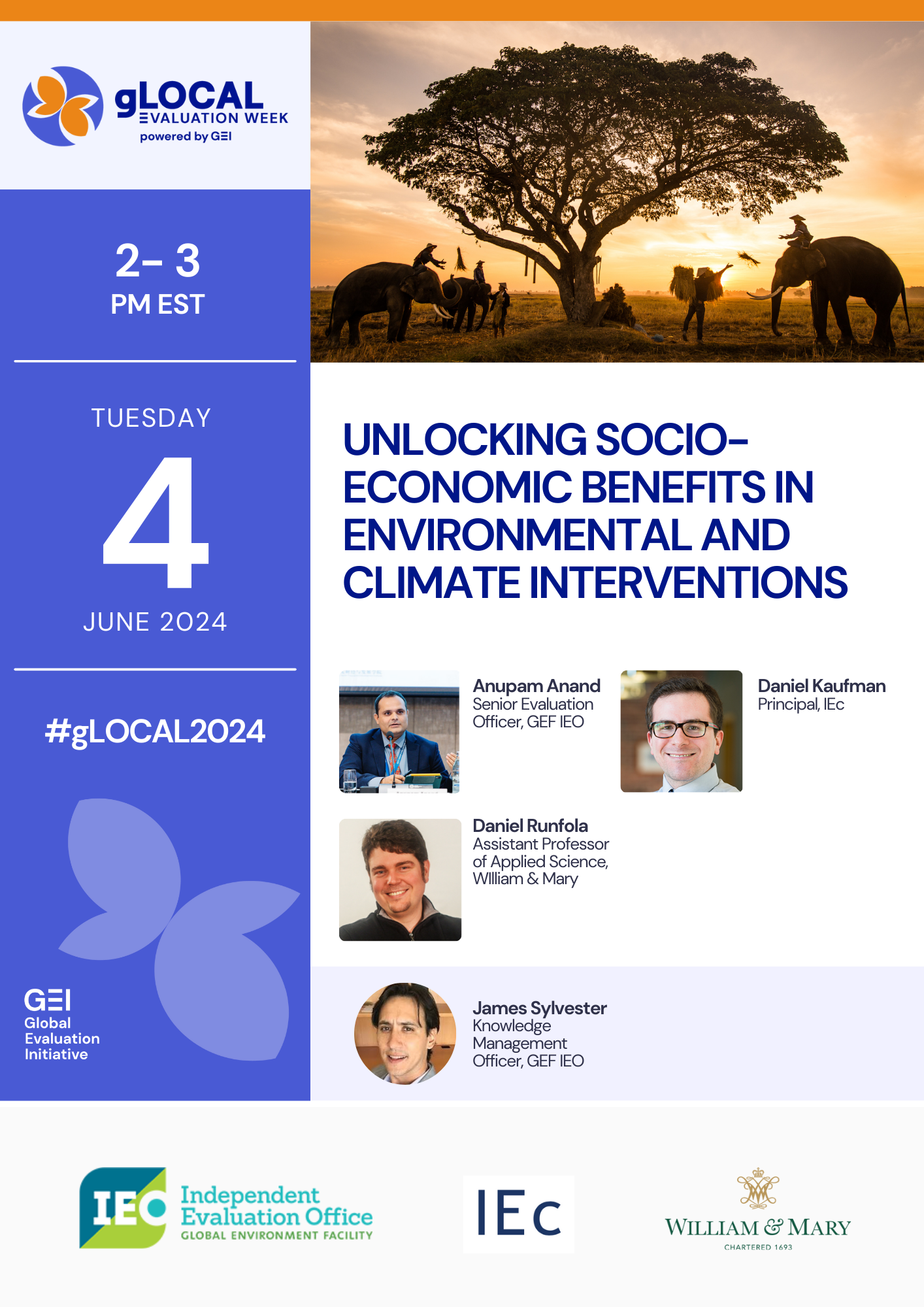Unlocking Socio-Economic Benefits in Environmental and Climate Interventions
Webinaire | En ligne
-
Organisé par:
GEF, Independent Evaluation Office
À propos de l'événement

As our planet grapples with environmental degradation and climate change impacts, assessing the socio-economic benefits of interventions that address these challenges becomes crucial. However, accurately assessing the socio-economic benefits can be challenging because these benefits can be multifaceted, encompassing changes in income, livelihoods, health, and social equity. Traditional results frameworks may not fully capture this complexity, and isolating the impact of environmental interventions from other social and economic factors can be difficult. This session tackles this very issue by showcasing mixed-method approaches used by major climate and environmental funds. We'll discuss methods that go beyond traditional measures, the value of field surveys, and the power of combining various data sources like surveys, geospatial information, and satellite remote sensing and the application of machine learning. Drawing insights from the evaluation efforts of prominent environmental funds and academic institutions in multiple geographies, this session empowers the evaluation community to gauge the socio-economic impact of interventions accurately. It encourages a more comprehensive approach to monitoring the outcomes of environmental and climate initiatives.
Conférenciers
| Nom | Titre | Biography |
|---|---|---|
| Anupam Anand | Senior Evaluation Officer, GEF IEO | Anupam Anand is a Senior Evaluation Officer at the Independent Evaluation Office of the Global Environment Facility (GEFIEO) with more than 15 years of combined experience in evaluation, international development, and academia. He leads evaluations on biodiversity, SFM and REDD+, nature-based solutions, land degradation, fragility and conflict, and illegal wildlife trade. He uses mixed-method approaches with geospatial analysis, computational social science, drones, and field-based techniques for problem-solving and evidence-gathering. |
| Daniel Kaufman | Principal, IEc | Daniel Kaufman is a Principal with Industrial Economics (IEc), an economics and environmental consulting firm. He has over 18 years of international program evaluation experience with organizations including the Global Environment Facility, World Bank Group, and Climate Investment Funds. He recently directed a mixed-methods evaluation of the development impacts of climate finance for the Climate Investment Funds. |
| Daniel Runfola | Assistant Professor of Applied Science, WIlliam & Mary | Dan is an Assistant Professor of Applied Science at William and Mary. He has research interests at the intersection of machine learning and unconventional applications for satellite image analysis. He guides undergraduate and Ph.D. students in research through the ICSS and geolab and contributes to the geoBoundaries Open Administrative Boundaries dataset through code development. Lately, he has been exploring the potential of novel neural network architectures for satellite data extraction, venturing into uncharted territory and embracing both successes and failures inherent to such pioneering efforts. |
Moderators
| Nom | Titre | Biography |
|---|---|---|
| James Sylvester | KM/Communications Officer, GEF IEO | Jimmy leads KM and communications initiatives at the GEF IEO. He has over 20 years of combined experience in international development, finance, evaluation, information design & data visualization, including IFC's Monitor Films evaluation series. Previously, Jimmy also worked as an Investment Officer for IFC's Financial Markets department in India and for both investment and advisory M&E departments. In addition, he also co-founded Kronicle, a crowdsourcing photo app, and worked in banking at Lazard Freres in New York. He holds an MPA/ID from Harvard Kennedy School and a B.A. from the University of Pennsylvania. |